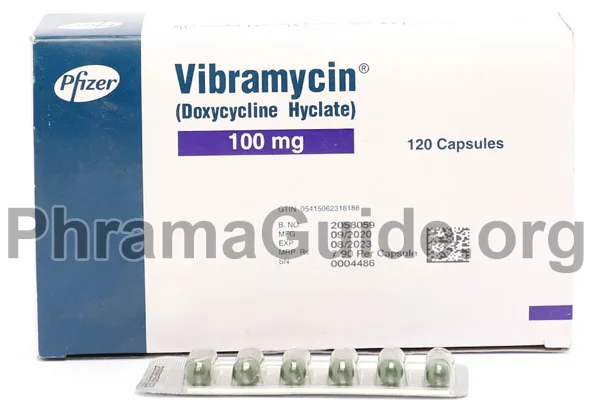Vibramycin is a broad-spectrum antibiotic commonly used to treat various bacterial infections. Like all medications, it can cause side effects in some individuals. Not everyone will experience these side effects, and their severity can vary.
Common Side Effects of Vibramycin
Gastrointestinal Distress:
- Nausea
- Vomiting
- Diarrhea
- Abdominal pain
- Loss of appetite
Esophageal Irritation:
- It’s important to take Vibramycin with a full glass of water and remain upright for at least 30 minutes after taking it to reduce the risk of esophageal irritation and ulceration.
Photosensitivity:
- Some people may become more sensitive to sunlight while taking Vibramycin. This can result in sunburn or skin rash after sun exposure.
Yeast Infections:
- Prolonged use of Vibramycin can sometimes lead to an overgrowth of yeast in the genital or mouth area.
Less Common Side Effects of Vibramycin
Allergic Reactions:
- Rash
- Itching
- Swelling of the face, lips, tongue, or throat (angioedema)
- Difficulty breathing
Liver Function Abnormalities:
- In rare cases, Vibramycin can affect liver function, leading to elevated liver enzymes.
Blood Disorders:
- Very rarely, Vibramycin can affect blood cell counts, leading to conditions like thrombocytopenia (decreased platelets) or anemia.
Kidney Issues:
- Vibramycin can, in rare instances, lead to kidney problems.
Intracranial Hypertension:
- This is a very rare side effect, characterized by increased pressure in the skull, leading to symptoms like severe headache, blurred vision, and nausea.
Dizziness and Vertigo:
- Some people may experience dizziness or a spinning sensation (vertigo) while taking Vibramycin.
Digestive Problems:
- Less common digestive issues include gastritis, esophagitis, and colitis.
Pseudotumor Cerebri:
- This is an extremely rare condition characterized by increased pressure inside the skull without a clear cause.

What is Vibramycin?
Vibramycin is one of the leading brands of Doxycycline Hyclate, manufactured and marketed by Pfizer Pharma Pakistan.
Vibramycin : Available Formulations and Strengths
Presently, Vibramycin is available in Capsule, and Tablet, Forms.
Vibramycin Capsule : 100mg Strength
Vibramycin Tablet : 100mg Strength
What Are The Possible Drug Interactions of Vibramycin?
- Antacids and Calcium Supplements: Antacids containing aluminum, calcium, or magnesium, as well as calcium supplements, can reduce the absorption of Vibramycin if taken at the same time. It’s best to separate their administration by at least 2 hours.
- Iron Supplements and Multivitamins: Iron supplements and multivitamins containing iron, as well as products containing zinc, can interfere with the absorption of Vibramycin. These should also be taken separately.
- Oral Contraceptives (Birth Control Pills): Vibramycin may reduce the effectiveness of oral contraceptives. Additional contraceptive methods should be considered while taking Vibramycin and for a few weeks after treatment.
- Blood Thinners (Anticoagulants): Vibramycin may increase the risk of bleeding when taken with anticoagulant medications like warfarin. Monitoring of blood clotting times may be necessary.
- Certain Antiseizure Medications: Some antiseizure medications, such as phenytoin, carbamazepine, and barbiturates, may decrease the effectiveness of Vibramycin.
- Methotrexate: Vibramycin can increase the levels of methotrexate in the blood, potentially leading to methotrexate toxicity.
- Isotretinoin: Taking Vibramycin with isotretinoin (used to treat severe acne) can increase the risk of intracranial hypertension (increased pressure inside the skull).
- Penicillin and Other Antibiotics: Combining Vibramycin with certain antibiotics may lead to decreased effectiveness or an increased risk of side effects.
- Biological and Targeted Therapies: Certain biological or targeted therapies used for cancer or autoimmune diseases may interact with doxycycline.
- Digoxin: Vibramycin may increase the levels of digoxin in the blood, potentially leading to digoxin toxicity.
- Lithium: Vibramycin may increase lithium levels in the blood, which can be toxic.
- Cyclosporine: Vibramycin can increase the blood levels of cyclosporine, which may lead to kidney damage.

Leave A Comment